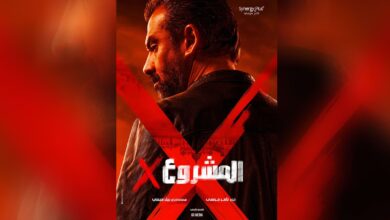There’s a reason why Adel Imam might soon find himself in a jail cell, although for most people it probably won’t make much sense. Sadly, it’s not for a role in a slapstick prison-set comedy, nor is it for his much-rumored ties to the Mubarak regime, which have so far failed to save him from his current woes.
Instead, the Arab world’s most revered comedian faces potential jail time for a series of supposedly “blasphemous” films — released two decades ago.
In February, a case was filed against Imam by Arsan Mansour, a lawyer accusing the actor of consistently “slandering Islam” — as well as several of its “symbols,” such as the jilbab and, in all seriousness, the beard — in his films “Al-Irhab wal-Kabab” (“Terrorism and Kebab”), “Al-Irhabi” (“The Terrorist”) and, breaking with tradition, “Teyour al-Zalam’’ (“Birds of Darkness”). The films were released in 1992, 1994 and 1995, respectively.
While the three films did generate some controversy upon their original release, this delayed legal reaction is being seen by most as having little to do with any alleged onscreen blasphemy, and more to do with the changes sweeping the nation.
The start of a new trend
Imam’s particular brand of “satire” has never been particularly witty or insightful, his punch lines usually stemming from the broadest and most obvious condemnations of easy targets, predominantly corrupt officials and religious fundamentalists. The fact that he has been able to build a career out of nudging sacred cows has in recent years led to speculation that the comedian was little more than a puppet of the Mubarak regime — yet his popularity has never been in question.
His films and plays continue to dominate at the box office, and he has come to be regarded as one of the last bastions of “clean,” or moral cinema. That has not saved him, however, from what can easily be seen as at best a shallow claim to fame, or the exploitation of new freedoms for the sake of settling old, personal scores — and, at worst, the first stages of an alarming new trend.
“On a personal level, I find it hard to be surprised by any of this,” sighs Gamal Eid, the human rights lawyer spearheading Imam’s defense team. “Our society has always had a significant amount of conservatives who, in these current circumstances, saw an opportunity and took it.”
From a purely legal perspective, however, Eid admits to being “shocked that the issue has gotten this far. Especially concerning that the prosecution has no legal basis whatsoever.” The case’s second court hearing session was held earlier this month.
Eid feels “almost” confident that, when the time comes, the entire case will be dismissed. The prosecution’s accusations, he believes, will immediately crumble when faced with an obvious question.
“These films are at least 10 years old. Why has it taken so long to complain about them?” he asks.
“The law recognizes that works of art cannot be dealt with in this manner,” Eid asserts. “Furthermore it is in no way legally permitted to take an individual to court based on statements made by them within the fictionalized context of a movie.”
The real problem, Eid insists, is the precedent this case has already set, as well as its implications. Over the past two months, three major film and television productions have been shut down for supposedly violating Sharia. Cases similar to the one against Imam have also targeted acclaimed filmmakers like Sherif Arafa, Wahid Hamed — both of whom can be counted among Imam’s frequent collaborators — and several others. These are only a few of the latest higher-profile incidents.
As Eid puts it, “They’re coming out of the woodwork now — all these self-righteous characters with cloudy intentions and misguided beliefs.”
Can other players face the rising wave?
Legally, Egypt is currently in a state where anything goes — as indicated by either the increasingly lawless streets, or a Parliament now firmly in the hands of a supposedly outlawed organization.The pre-revolutionary culture scene was schizophrenic — eagerly promoting cheap sexual ploys to the public while simultaneously preaching strict moral values, espousing the importance of freedom while somehow convincing an entire nation that freedom has a limit. But now, with far less in the way of regulators or even a clearly defined set of guidelines, the cultural landscape is up for grabs. If extremists and glory-hounds seek to stake their claim, there’s no person — or, apparently, law — to stand in their way.
Which is where the Egyptian Creativity Front steps in. The front is a recently formed coalition of artists who have tasked themselves with, according to their press release, “liberating the Egyptian will by removing all kinds of restrictions on freedom of thought, opinion and creativity.” Yet rather than building a strong public presence by addressing an unprecedented and potentially trendsetting issue, the front has remained outwardly quiet, failing to fulfill the vows made in their dramatically worded first statement, among which is the promise to “use every means of pressure and objection to express our rejection of prejudice … even if the price is our lives.”
Inwardly, these issues have at least been discussed, if not yet acted upon — perhaps because the new organization isn’t sure of how to tackle what it sees as only a front for more sinister motives.
“These cases are all purely political issues; they have nothing to do with either religion or freedom of expression,” states Abdel Galil al-Sharnouby, Egyptian Creativity Front member and former member of the Muslim Brotherhood, as well the former editor-in-chief of the Brotherhood website. “The real purpose behind all this is to further fragment public opinion and introduce new ‘controversial’ issues in order to distract from more significant matters.”
He also points to the fact that Imam’s sentence was issued in the very first hearing, which is “highly unusual.”
For Sharnouby, it’s clear these cases of extreme censorship of the arts exist only to “mislead, misinform and manipulate” — tactics that he believes the Egyptian public should be bitterly familiar with by now.
“This is exactly the type of stuff the Mubarak regime used to pull,” he explains. “In this case, we’re not only being distracted from critical issues like the state of lawlessness, or the drafting of a new constitution, or the economy — we’re also being made to resent the revolution.”
According to Sharnouby, these are the initial stages of a systematic attack on the values upheld by the revolution.
“Freedom was one of the demands of the revolution, demanded even before social justice,” he says, referring to one of the key chants of the uprising. “So, as an act of revenge, those sympathetic to the former regime are attacking all our freedoms now, and doing so under a religious pretext to play on widespread fears of a strictly Islamic state.”
Sharnouby, who is also a screenwriter and a film critic, insists those fears are completely unfounded.
“I was simultaneously involved in both the Muslim Brotherhood and the arts, just as [Brotherhood founder] Hassan al-Banna was,” he says. “I can assure you, the Brotherhood is not seeking to ban the arts or reshape the cultural scene according to their limited understanding of it.”
Words that will bring comfort to few — especially when scenes like MPs interrupting parliamentary sessions with a call for prayer, or physically preventing acclaimed filmmakers from filming inside a mosque, are not uncommon. Sharnouby shrugs these incidents off, explaining “these are just a few bad apples and unqualified individuals — it’s unavoidable. These people in Parliament lack experience. It will take some time for them to find their footing, not to mention a common ground.”
What is more important, he insists, is that “the Brotherhood realizes now — for better or worse — that the Egyptian people will never again give up their freedom, and if the organization wishes to survive, they must learn to adapt to a rapidly changing world.”
Regrettably, the few signs of change that have been seen across the cultural landscape have, so far, brought little in the way of reassurance or progress. Meanwhile, the creativity front and other organizations that seem to exist merely to point a collective finger continue to fail at providing any positive results.
The Egyptian Creativity Front is soon scheduled to meet with officials from the Religious Endowments Ministry to discuss “a whole variety of issues,” Sharnouby states. It should be noted that, traditionally, the ministry has no role in cultural production — it forced itself onto the scene when it stepped in to prevent a film crew from shooting in a mosque some weeks ago. Imam’s lawyer says the actor is “still in the country,” contrary to previous reports, and that he “is prepared to appeal the court’s decision, should he be found guilty.” A verdict is expected on 26 April.




